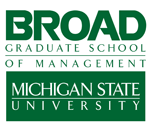Michigan State University research reveals "flaw" in MBA Program Rankings
October 29, 2009 (PRLEAP.COM) Education News
Researchers at Michigan State University have found new data that suggests business school media rankings could be "fundamentally flawed." According to Frederick P. Morgeson, professor of Management and Valade Research Scholar at the Eli Broad Graduate School of Management at Michigan State University, you may be waiting a long time to see your school ranked, if it is not already.Morgeson and Broad School doctoral candidate Jennifer Nahrgang are the first to empirically study the BusinessWeek rankings in order to understand the level of ranking stability across time and examine what predicts them. They found that not only has this ranking been extremely stable since it was created in 1988, it can also be predicted with relatively few variables.
"Our data shows that BusinessWeek MBA program rankings are suspiciously invariant across time, have a large reputational component, and appear to be based on student ratings that largely reflect economic outcomes that are unrelated to educational experiences or quality," Morgeson says. "We chose to focus on BusinessWeek because it was the first ranking system of business schools published in the popular press and is by far the most influential ranking list according to numerous scholars."
Morgeson's research, "Same as It Ever Was: Recognizing Stability in the BusinessWeek Rankings," was recently published in the Academy of Management Learning & Education and outlines the stability of the BusinessWeek MBA program rankings in three quantifiable ways:
* An examination of the consistency in rankings across the years (i.e., is a school ranked in the same or similar place from year to year) showed very high correlations from one bi-annual ranking to the next - "correlations so high that it really calls into question the legitimacy of the rankings," Morgeson says;
* An assessment of how many schools were ranked one year and unranked the next showed an average of 1.63 schools drop off the list in any given year, and never have more than four schools dropped off the list in any particular year - across years, the rankings contain 84-97 percent of the same schools;
* An evaluation of the number of schools that have always been ranked shows that, of the 20 schools on the original 1988 list, 18 of them have always been ranked, and only 35 schools have ever been ranked.
Morgeson and Nahrgang also looked at the factors that drive the rankings, including reputation, the length of time each school has been in existence, Graduate Management Admission Test (GMAT) test scores and past work experience as the gauge of student quality, placement success, and faculty research productivity.
"Because BusinessWeek treats small, insignificant differences between schools as meaningful, maybe a better way to evaluate business schools is a credible rating system as opposed to a ranking system," Morgeson says. "Schools that are not significantly different in terms of ratings can then be treated as functionally equivalent in terms of quality. Such a system would be more accurate and helpful to prospective students."
To listen to a podcast interview with Morgeson on this subject, please visit http://www.bus.msu.edu/information/podcasts.cfm?id=1
The Eli Broad College of Business/Eli Broad Graduate School of Management at Michigan State University is consistently among the top-ranked business schools in the country, with more than 5,000 students enrolled in undergraduate, MBA, masters, doctoral and executive development programs. Its mission is to excel in the education and development of business leaders and in the creation and dissemination of knowledge, leading to national and international prominence.
